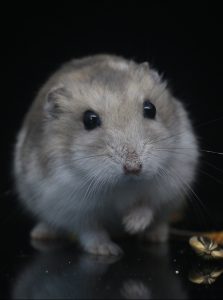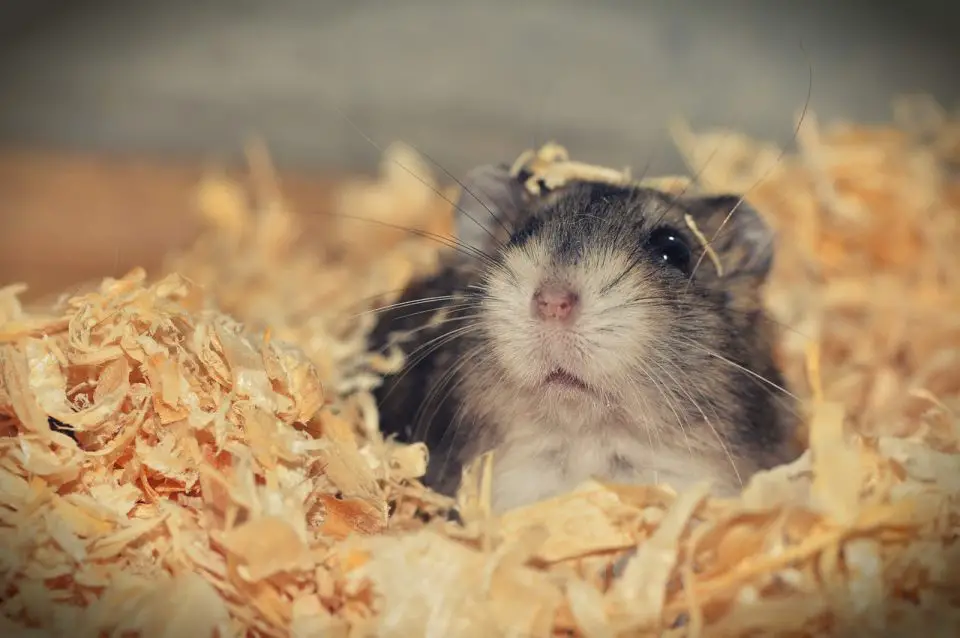Hamsters make great pets, especially for older children who are responsible enough to begin looking after their own animals.
They’re interactive, charismatic, and each one has a unique personality that allows them to truly bond with their owner.
However, when it comes to deciding whether or not to adopt a hamster, a lot of people worry about the smell.
Whether it’s a rabbit or a hamster or a dog, whether or not your new pet will smell is a big question that all potential pet owners will ask.
Many people feel like rodents are inherently on the stinkier side, but this isn’t necessarily true.
You see, hamsters are the cats of the rodent world. They hate being dirty and will often spend hours grooming themselves in order to maintain a picture of perfect hygiene.
However, due to the fact that hamsters spend the majority of their life in their cage, between food and water spills and using the restroom on their bedding, it’s impossible for hamsters cages not to develop that notorious foul smell.
That doesn’t mean you have to give up your dream of owning one of these sweet little rodents to save your nose, however.
Thankfully, there are dozens of methods and products for mitigating hamster smells so that you can both live in a happy, stink-free environment.
How to Mitigate the Smell of Hamsters
There are many ways to mitigate hamster smells so that both you and your furry friend can live in a clean environment.
Many options involve simple lifestyle changes or cleaning routines, but you can also pick up several commercial and natural cleaners to help reduce smells.
Practice Healthy Hamster Hygiene
While hamsters are notorious self-groomers, it doesn’t hurt to help them out every now and then – just never wash them with water!
Instead, you can help by cleaning their cage regularly to remove any waste or old bedding.
When hamsters are forced to live in dirty conditions, they can develop wet tail, a disease caused by stress that can lead to death within 72 hours. This is why providing a clean environment is so important.
You can also provide a dust bath once a week for your hamster to ‘bathe’ in.
Dust acts as a dry shampoo of sorts, neutralizing odors and soaking up excessive oils without damaging your hamster’s coat or causing skin irritation.
Change Location
 No matter how much you do to mitigate and prevent smells, there is a possibility that there will still be some odor associated with your hamster’s cage.
No matter how much you do to mitigate and prevent smells, there is a possibility that there will still be some odor associated with your hamster’s cage.
If this is the case for your hamster, then you may want to consider relocating their cage. Having their cage in a well-ventialited area is the key to helping reduce any lingering odors.
However, make sure that, while the area is well-ventilated, it is not drafty. A drafty room can cause your hamster to develop a respiratory infection and fall ill.
Also, while it may be one of the best ventialted areas in your home, don’t house your hamster in your kitchen.
Small rodents are known for carrying certain types of bacteria, such as Salmonella, which can make you sick if ingested.
Switch Bedding
One of the main sources of odor in hamsters is their bedding. This is because this where they use the bathroom, so their bedding is saturated with urine and feces.
While regular cleaning is essential to fighting smells, you may notice that even that is not enough to help fight any lingering odors that are filling your house.
If this is the case for you, you may want to consider switching to a different type of bedding.
There are many different options for bedding, some better than others.
You want to use soft bedding that doesn’t have any sharp edges like coconut fiber or cedar and pine wood, but you also don’t want it so soft that it gets caught in your hamster’s feet.
You should also avoid anything with harmful, unnatural chemicals, such as newspapers that use ink.
To help you switch bedding, here is a list of three of the top hamster cage beddings as well as a list of beddings to avoid in order to maintain your hamster’s health.
Best Types of Bedding for Hamsters
Aspen
Wood Pulp
Paper
Beddings to Avoid
Cedar
Pine
Scented bedding
Cotton
Straw
Sawdust
Newspaper or other types of paper with ink
Cat litter, especially clumping
Coconut fibers
Fabric
Top 5 Products for Reducing Hamsters Smell
1) Kaytee Smellin Good Critter Spray
This spray is non-toxic and safe for all small mammals, including hamsters, so that you can fight odors without worrying about your hamster’s health.
It has a faint baby powder scent which is clean but not overwhelming. It’s easy to use, and you only need a spritz or two to freshen up your hamster’s cage.
Since it is in a controlled spray bottle, you can spray this directly in your hamsters cage, targeting potty spots to help reduce smell in between cleanings and bedding changes.
While some consumers do spray this directly onto their hamsters, that is not recommended. While this is a non-toxic and safe spray, it is still a water-based product.
As a result, it can still cling to your hamster’s skin, causing infections that could lead to death.
Instead, spray it onto your hamster’s bedding sparingly – you don’t need to saturate the bedding – and their items to help fight odors.
2) Grand Life Brands Odor Absorbing Bag
This odor-absorbing bag is designed to not only cover up odors so that you don’t have to smell them but to completely neutralize and remove them so that they don’t linger.
They’re designed to cover up everything from the smell of dead animals to trash, meaning that it works great for covering up the smell of your hamster’s cage.
One important thing needed to be noted, however, and this goes for all types of odor absorbing bags: do not put this in your hamster’s cage.
It’s important that you keep these bags out of your hamster’s reach.
Hamsters are notorious chewers, and while the Grand Life Brands’ odor bag is safe and nontoxic, it still isn’t something that your hamster needs to consume.
Even if it doesn’t have chemicals, it can still cause a blockage.
3) Earth Care Odor Removing Bag
With seven buying options that include a variety of different bundles with up to 10 bags, this deodorizing bag is great if you’re looking to buy multiple.
It removes – not cover up, but neutralizes and removes – odors, acting much like a sponge.
It’s all-natural and non-toxic, making it safe for your hamsters, while also being easy to dispose of for hassle-free deodorization.
The Earth Care bag reduces a majority of odors within 24 hours and works in up to 100 square feet for up to four months.
This means that you can place the bag far away from your hamster’s cage – so that you don’t have to worry about them getting ahold of it – but still not have to worry about it not working.
4) No Scent Pet Odor Eliminating and Cleaning Spray
This all-natural, 100% sustainable cleaner utilizes odor neutralizing enzymes that break down scents while cleaning your hamster’s cage.
You can also spray it onto their bedding to help fight odors.
It is designed specially to work on small animal’s waste by utilizing ingredients that help fight the components of your hamster’s waste, such as the pH level of their urine or amount of cellulose in their feces.
Since this probiotic spray is all-natural and non-toxic, you also won’t need to remove your hamster from their cage to spray this cleaner, allowing you to fight hamster odors hassle-free.
5) Nature’s Miracle Cage Cleaners
This pet-safe cage cleaner utilizes a bio-enzymatic formula that fights odors from the source to completely neutralize them and not just cover them up.
Nature’s Miracle also works to remove stains, and, so long as you store it properly, you don’t have to worry about it harming your hamster if you use it directly on their bedding or hutches.
It also has a money-back guarantee, allowing you to shop with ease.
How to Mitigate Hamster Smells Naturally
If you’re looking for a more natural approach to mitigating the smell of hamsters, look no further!
Thankfully, it’s both possible and easy to maintain a stink-free enclosure for your hamster without sacrificing their health.
There are two main ways to naturally reduce hamster odors, and they can actually be used together!
First, remove everything from your hamster’s cage when it comes time for cleaning. Then, instead of just giving the tray a quick rinse, wash it well and then scrub it with white vinegar.
This will help reduce any lingering smells and help prevent them from coming back.
Then, when the tray for your hamster’s cage is dry, you can spread a thin layer of baking soda along the bottom before you place in their bedding.
Baking soda is known for neutralizing and absorbing odors, and it works well in your hamster’s cage.
You can also sprinkle baking soda along the top of the bedding once it placed to help fight odors as well.
Why Can’t I Wash my Hamster?
There are several reasons why you should never wash your hamster with water.
Like with other rodents, such as rabbits and chinchillas, dust baths are okay, but washing your hamster with water could result in them becoming sick and dying.
Also, for the most part, hamsters, like cats, will handle their grooming themselves.
Water can be extremely dangerous for your hamster. First, a bath will remove the oils from their fur, and they may not be able to reproduce them.
These oils are for more than keeping your hamster’s coat shiny and healthy – they also act as insulation to help your hamster maintain and regulate their body temperature.
Bathing your hamster can also cause deadly infections, especially in longer haired varieties. This is because water could get trapped under the fur and not dry correctly.
Damp and dark is a recipe for trouble, as this can lead to the growth of bacteria which can make your hamster sick or even kill them.
As a result, you should always avoid allowing your hamster to come in contact with water that isn’t in their water bottles in order to maintain their health and longevity.
Instead of washing your hamster, provide dust baths for them. If you need to remove debris from their fur, you can use a thin tooth comb designed specifically for smaller mammals.
What Will Cause my Hamsters to Smell More?
This mostly applies to female Syrian hamsters. Have you noticed a foul odor recently that is coming directly from your hamster and not her enclosure?

This odor is normally musky and pungent, making it hard to miss. While it may be unpleasant to smell, thankfully, there usually isn’t anything wrong.
This odor is normally a result of your Syrian hamster going into heat, where she is more receptive to males for breeding.
Since Syrian hamsters are lone wolves and don’t live in groups, it can be difficult for females to find a suitable mate.
As a result, evolution has given them a biological broadcasting system – their scent – to let males know that they are open to advances.
A hamster’s heat period is short – usually only a few days long – so you won’t have to worry about this smell for long before it’s gone.
Final Thoughts: Do Hamsters Smell?
| The main point you should draw from this is that it’s not your hamster that stinks but rather his or her surroundings that make hamsters smell. |
After all, their cage is where their entire life unfolds – from day to day activities like playing and sleeping to bodily functions such as using the bathroom.
It’s only natural that their cage will have less than pleasant odor. However, there’s an easy fix to this, thankfully.
Between commercial products, healthy hygiene habits, and all-natural DIY remedies, there’s no shortage of ways to combat stinky hamster cage odors so that you – and your hamster – can live happy stress-free lives.





